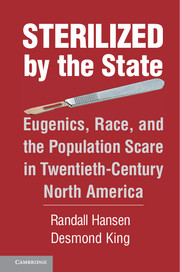2 - The Eugenicists
Short Portraits
Published online by Cambridge University Press: 05 June 2014
Summary
I am inclined to agree with Francis Galton in believing that education and environment produce only a small effect on the mind of any one, and that most of our qualities are innate.
Charles DarwinThe founding fathers of eugenics had much in common, and yet there was much that differentiated them. When thinking about their ideas, the task for both writer and reader is to do justice to the differences among them while highlighting what bound them together in order to isolate the core tenets of eugenics. These two goals occupy, respectively, this chapter and the next. One way to approach the former objective is to learn of the eugenicists themselves, their histories, and the evolution of their thinking. Once these biographical and intellectual differences are highlighted, we can then bring out the commonalities among eugenicists
Whereas the bulk of this book will focus on coerced sterilization in liberal democracies – and therefore most attention is given to the United States and Canada – ideas originated on and traveled in both directions across the Atlantic. The intellectual and personal histories of British and German, as well as of American and Canadian eugenicists, are relevant to this end. Throughout, it is important to keep in mind that eugenic ideas would not have been translated into practice without doctors, psychiatrists, superintendents (many of whom were doctors in homes for the feebleminded), and social workers. At the same time, these actors would have found their efforts to develop, adopt, and implement sterilization policies much more difficult, if not impossible, without the justificatory strength of eugenics. As argued in the introduction, (eugenic) ideas and (medical, institutional, psychiatric) interests reinforced each other and, in so doing, effected substantial policy change.
- Type
- Chapter
- Information
- Sterilized by the StateEugenics, Race, and the Population Scare in Twentieth-Century North America, pp. 27 - 48Publisher: Cambridge University PressPrint publication year: 2013



